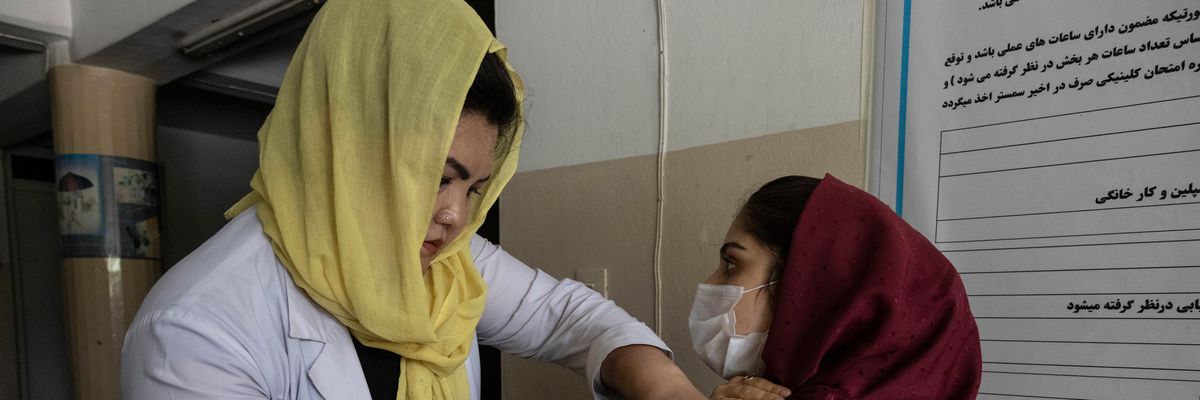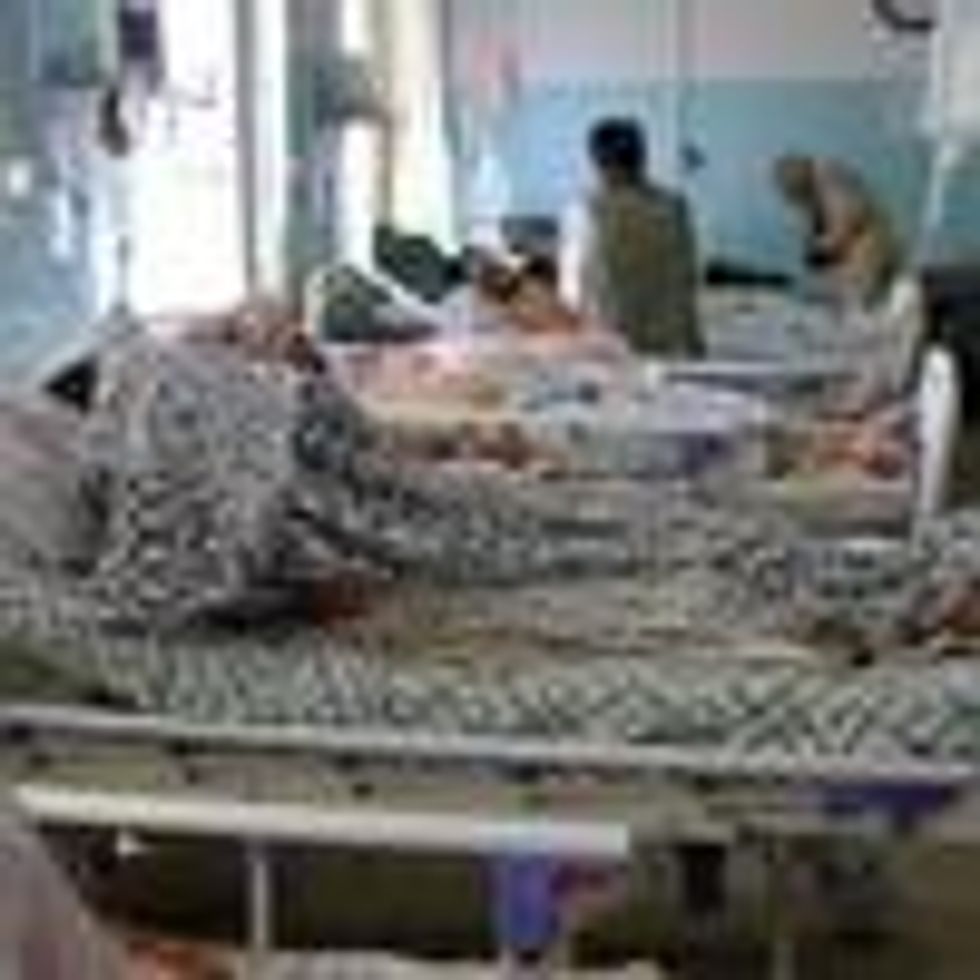As the World Bank held its annual meeting on Wednesday, women's rights advocates gathered outside the powerful institution's headquarters in Washington, D.C., to demand the release of frozen Afghan funds so that teachers and healthcare workers trying to rebuild war-torn Afghanistan can be paid.
"After 20 years of military operations that killed tens of thousands of Afghans, the U.S. should not retaliate against the people of Afghanistan."
CodePink, a women-led peace group and member of the new Unfreeze Afghanistan coalition behind Wednesday's press conference, said in a statement that "after the fall of Kabul to the Taliban, the U.S. froze nearly $10 billion in assets belonging to the Afghan central bank and stopped shipments of cash to the country."
"The International Monetary Fund has frozen the distribution of more than $400 million destined for Covid relief and the World Bank is holding back hundreds of millions in the Afghan Reconstruction Trust Fund," CodePink noted. "Foreign aid to Afghanistan had previously been about $8.5 billion a year--nearly half of the country's gross domestic product, and the freezing of funds has been disastrous for the Afghan people."
Unfreeze Afghanistan is calling on the Taliban to reopen all schools for boys and girls throughout the country, but it also emphasizes that international financial institutions--where the U.S. plays an outsized role--must make possible the reopening and operation of those schools by disbursing the frozen funds.
"After 20 years of military operations that killed tens of thousands of Afghans, the U.S. should not retaliate against the people of Afghanistan for its withdrawal by withholding funding for health, education, and other social services," said retired U.S. Army Colonel Ann Wright, who as a State Department official helped reopen the U.S. Embassy in Kabul in 2001. "Those funds are now the property of Afghanistan and must go to the people providing essential services."
CodePink co-founder Medea Benjamin stressed that freezing funds in an attempt to sanction the Taliban harms innocent Afghans most of all, including educators and students, as well as medical professionals and patients--people in need and those trained to help them.
"We share the international concern over Taliban rule and the assessment that their government should not be recognized until it proves its commitment to basic norms such as women's rights to education and jobs," she said, "but holding back funds for teachers and healthcare workers is punishing the victims."
Prominent women pressuring the World Bank to release frozen Afghan funds include Pulitzer Prize-winning author Alice Walker; Jamila Safi, president of the Afghan Female Teachers Association; Toorpakai Momand, former director of Female Education in Afghanistan; Sunita Mehta, co-founder of Women for Afghan Women; and Sonali Kolhatkar, co-director of the Afghan Women's Mission.
In addition, more than 3,000 people have expressed their support by signing a petition hosted on the CodePink website.
Unfreeze Afghanistan was formed in response to an urgent appeal from the 45,000-member Teachers Association of Afghanistan, which warned on October 6 that the situation for teachers is grave, as most have not received a paycheck since June.
"The Ministry of Education has very few resources, and it is hard to ask our teachers to keep working without salaries," reads last week's statement from the Afghan teachers union, according to CodePink. "Many of them are the sole breadwinners in their families, and they are really struggling. It will be difficult to keep the schools open if we have no funds."
Related Content
Aid Groups Warn Afghan Health System on Verge of 'Collapse'
Julia Conley
Healthcare workers are also being forced to endure inhumane and unsustainable conditions.
World Health Organization Director-General Tedros Adhanom Ghebreyesus has sounded the alarm about Afghan clinics and hospitals being unable to pay nurses and doctors due to a lack of resources.
Funding cuts, he warned last month, are forcing health providers to decide "who to save and who to let die."
According to the United Nations Development Programme's (UNDP) Asia-Pacific director Kanni Wignaraja, just 17% of roughly 2,200 medical facilities funded by the World Bank are "fully functional" and remaining staff are working on a voluntary basis.
If money is not provided immediately to cover salaries, she told the Washington Post last week, "there is a risk that the Afghan people will have virtually no access to primary health services."
Acknowledging "the concern that money might not get to the intended workers," Unfreeze Afghanistan argued that "there are a variety of verifiable mechanisms, such as one the UNDP hopes to initiate to pay thousands of healthcare workers."
"Payment mechanisms exist," the coalition added, "that are transparent and traceable, and that allow either for direct payment to the individuals entitled to receive them, payment through NGOs (as already existed in the case of many healthcare facilities), or accountability for a more centralized payment system."


